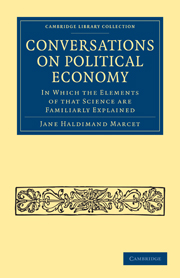Book contents
- Frontmatter
- PREFACE
- Contents
- CONVERSATION I INTRODUCTION
- CONVERSATION II INTRODUCTION—continued
- CONVERSATION III ON PROPERTY
- CONVERSATION IV PROPERTY—continued
- CONVERSATION V ON THE DIVISION OF LABOUR
- CONVERSATION VI ON CAPITAL
- CONVERSATION VII CAPITAL—continued
- CONVERSATION VIII ON WAGES AND POPULATION
- CONVERSATION IX WAGES AND POPULATION—continued
- CONVERSATION X ON THE CONDITION OF THE POOR
- CONVERSATION XI ON REVENUE
- CONVERSATION XII REVENUE FROM LANDED PROPERTY
- CONVERSATION XIII REVENUE FROM THE CULTIVATION OF LAND
- CONVERSATION XIV REVENUE FROM CAPITAL LENT
- CONVERSATION XV ON VALUE AND PRICE
- CONVERSATION XVI ON MONEY
- CONVERSATION XVII MONEY—continued
- CONVERSATION XVIII COMMERCE
- CONVERSATION XIX ON FOREIGN TRADE
- CONVERSATION XX FOREIGN TRADE—cont.
- CONVERSATION XXI ON EXPENDITURE
- INDEX
CONVERSATION IX - WAGES AND POPULATION—continued
Published online by Cambridge University Press: 07 September 2011
- Frontmatter
- PREFACE
- Contents
- CONVERSATION I INTRODUCTION
- CONVERSATION II INTRODUCTION—continued
- CONVERSATION III ON PROPERTY
- CONVERSATION IV PROPERTY—continued
- CONVERSATION V ON THE DIVISION OF LABOUR
- CONVERSATION VI ON CAPITAL
- CONVERSATION VII CAPITAL—continued
- CONVERSATION VIII ON WAGES AND POPULATION
- CONVERSATION IX WAGES AND POPULATION—continued
- CONVERSATION X ON THE CONDITION OF THE POOR
- CONVERSATION XI ON REVENUE
- CONVERSATION XII REVENUE FROM LANDED PROPERTY
- CONVERSATION XIII REVENUE FROM THE CULTIVATION OF LAND
- CONVERSATION XIV REVENUE FROM CAPITAL LENT
- CONVERSATION XV ON VALUE AND PRICE
- CONVERSATION XVI ON MONEY
- CONVERSATION XVII MONEY—continued
- CONVERSATION XVIII COMMERCE
- CONVERSATION XIX ON FOREIGN TRADE
- CONVERSATION XX FOREIGN TRADE—cont.
- CONVERSATION XXI ON EXPENDITURE
- INDEX
Summary
CAROLINE
I HAVE been reflecting a great deal on our last conversation, Mrs. B., and the conclusions I have drawn from it are, that the greater the capital a country possesses, the greater number of people it can maintain, and the higher the wages of labour will be.
MRS. B
The greater the stock of subsistence, the more people may be maintained by it, no doubt; but your second inference is not at all a necessary conclusion. China is a very rich country, and yet wages are I believe no where so low. The accounts which travellers give of the miserable state of the inferior classes, are painful to hear; and their poverty is not the result of idleness, for they run about the streets with tools in their hands, begging for work.
CAROLINE
That is owing to the immense population of China; so that, though the capital of the country may be very considerable, still it is insufficient for the maintenance of all its inhabitants.
MRS. B
You should therefore always remember that the rate of wages does not depend upon the absolute quantity of capital, but upon its quantity relative to the number of people to be maintained by it. This is a truth which, however simple, is continually lost sight of, and hence arise errors without number in political economy. If China had ten times the wealth it actually possesses, and its population were at the same time tenfold as numerous, the people would not be better fed.
- Type
- Chapter
- Information
- Conversations on Political EconomyIn Which the Elements of that Science are Familiarly Explained, pp. 135 - 151Publisher: Cambridge University PressPrint publication year: 2010First published in: 1816



